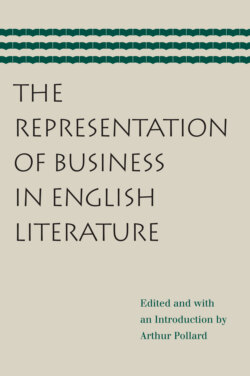Читать книгу The Representation of Business in English Literature - Группа авторов - Страница 14
На сайте Литреса книга снята с продажи.
DEBATE ON LUXURY: STANDARDS AND QUALITY
ОглавлениеMandeville was contributing to a debate which went beyond the pros and cons of public credit to the question of whether economic growth in general was beneficial to society. This debate centred round the word “Luxury” in the sense of demands for commodities which drove up the standard and the cost of living. Mandeville was quite convinced that it was beneficial. Luxury “employed a million of the poor.” It was particularly the conspicuous consumption of the aristocracy whose demand for buildings, furniture, equipages and clothes stimulated the urban economy. Above all, it was the insistence of upper-class women on luxury goods which swelled the demand for them: “. . . the variety of work that is performed and the number of hands employed to gratify the fickleness and luxury of women is prodigious.”13
Swift was convinced that Luxury was detrimental to social well-being. He got Gulliver to complain that he wore “the workmanship of a hundred tradesmen; the building and furniture of my house employ as many more; and five times the number to adorn my wife.” He was particularly scathing about the extravagance of women, asserting that “this whole globe of earth must be at least three times gone round, before one of our better female Yahoos could get their breakfast, or a cup to put it in,” while
in order to feed the luxury and intemperance of the males, and the vanity of the females, we sent away the greatest part of our necessary things to other countries, from whence in return we brought the materials of diseases, folly and vice to spend among ourselves.14
The dispute over luxury was thus at bottom a debate about the impact of overseas trade on society. Reactionaries like Swift deplored its allegedly corrosive effect on manners and morals, while progressive thinkers like Mandeville welcomed its contribution to improving the standard of living and the quality of life. Among the enthusiasts for the burgeoning commercial activity in the middle of the eighteenth century was the poet John Dyer, who published a georgic poem in four books, The Fleece, in 1757. It celebrated the providential ordering of the global economy, whereby God had distributed different resources throughout the world, the exchange of which between nations benefitted mankind. Commerce was therefore part of the divine plan, and did not deserve aristocratic disdain.
To censure Trade
Or hold her busy people in contempt,
Let none presume.
The bulk of The Fleece was an encomium on the textile industry. Describing the district around Leeds, Dyer observed that “all is joy; And trade and business guide the living scene.” Among the more reactionary was John Brown, who published a celebrated Estimate of the Manners and Principles of the Times in 1756. In it he claimed that there were three stages of commerce. The first was confined to the exchange of necessities. The second was concerned with trade in conveniences. The third exploited demand for luxuries. Where the first two stages were beneficial the third was pernicious since it eroded morality and rendered a nation effeminate. Brown was convinced that it had already corrupted the English aristocracy and threatened to corrupt the middle and lower orders. By 1763 an anonymous tract, The Tryal of the Lady Allurea Luxury, lamented that “almost every order of people amongst us, even to the meanest of the mechanics, are seduced by her malice.”
The novelist Tobias Smollett joined in the debate. His Complete History of England, as well as his novels, can be read as a diatribe against the rising tide of luxury provoked by excessive demand, especially from females. Thus in the History luxury is vividly portrayed as a tidal wave which swept in with the Revolution of 1688 and inundated the country under the Hanoverians until by 1748 “an irresistible tide of luxury and excess” had “flowed through all degrees of the people, breaking down all the mounds of civil polity and opening a way for licence and immorality.”15 Similar sentiments are expressed in all his novels but above all in Humphry Clinker. Matthew Bramble was taken aback by the prodigal size of London. “There are many causes that contribute to the daily increase of this enormous mass,” he observed, “but they may be all resolved into the grand source of luxury and corruption.” This was attributed by Lismahago to “the sudden affluence occasioned by trade” which “forced open all the sluices of luxury and overflowed the land with every species of profligacy and corruption.” The contagion had even reached his native Scotland.
The Scots, not content with their own manufactures and produce, which would very well answer all necessary occasions, seem to vie with each other in purchasing superfluities from England, such as broadcloth, velvets, stuffs, silks, lace, furs, jewels, furniture of all sorts, sugar, rum, tea, chocolate and coffee.16
Like Mandeville and Swift, Smollett attributed the rise of luxury above all to the insatiable demand of women for a luxurious life style, giving several examples in the novel of wives who had ruined their husbands by living beyond their means. The sexism was quite explicit, for the classical figure Luxuria was a female. Luxury was accused of emasculating society and making it more effeminate.
